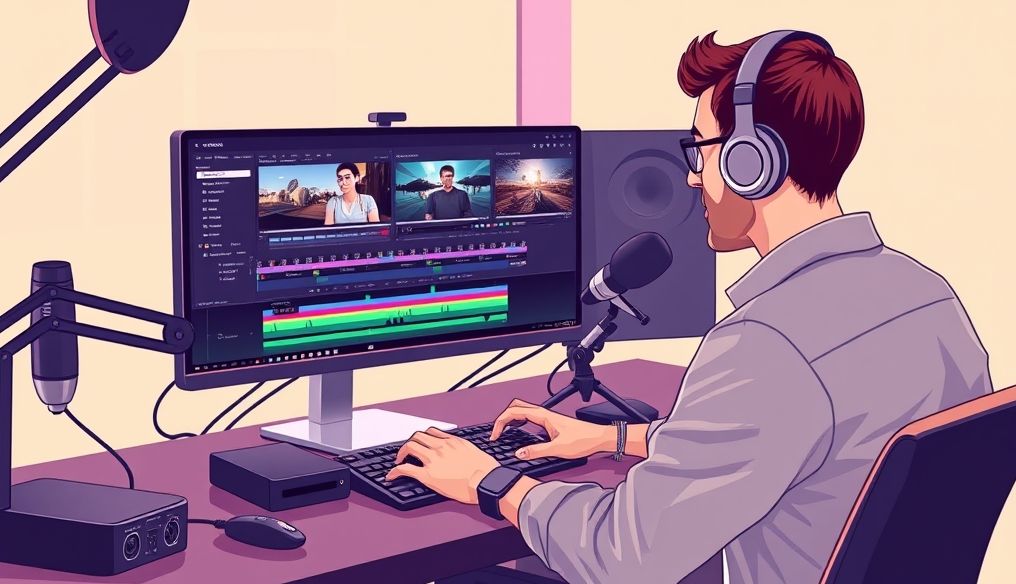Video Editing: A Lucrative Career and Promising Investment Opportunity
In the age of visual content, video editing has become an essential skill in various fields. From marketing and advertising to education and entertainment, everyone needs engaging and well-crafted videos. This growing demand creates promising investment opportunities for individuals and companies alike.
Chapter 1: Why Video Editing is a Profitable Career
The video market is experiencing tremendous growth, driven by the popularity of platforms like YouTube, TikTok, and Instagram. According to Statista, users spend an average of hours per day watching videos online. This means that businesses and individuals constantly need high-quality video content, increasing the demand for video editing professionals.
The Importance of Video in Marketing
- Increasing brand awareness
- Improving conversion rates
- Effective communication with the audience
- Achieving a high return on investment
Examples from the Global Market
Globally, we see startups relying heavily on video in their marketing strategies. For example, many e-commerce startups use product demonstration videos to increase sales. Additionally, social media influencers rely on video to earn money through advertising and sponsorships.
Chapter 2: Essential Skills Required in Video Editing
To become a successful video editing professional, you need to acquire a range of technical and creative skills.
Technical Skills
- Proficiency in editing software (Adobe Premiere Pro, Final Cut Pro, DaVinci Resolve)
- Understanding the basics of filming and lighting
- Knowledge of different video formats
- Ability to work with sound and sound effects
Creative Skills
- Sense of visual aesthetics
- Ability to tell stories through video
- Innovation and creativity in ideas
- Ability to work under pressure and deadlines
Chapter 3: How to Start Your Career in Video Editing
There are several ways to start your career in video editing, whether you prefer freelancing or full-time employment.
Freelancing
Freelancing offers great flexibility and the opportunity to set your own prices. You can register on freelancing platforms like Upwork and Freelancer and start looking for projects.
Full-Time Employment
You can search for jobs in media production companies, marketing agencies, educational institutions, and large corporations that have internal video departments.
Chapter 4: Building a Strong Portfolio
A portfolio is the most important marketing tool for a video editing professional. It should include your best work and reflect your skills and abilities.
Tips for Building an Attractive Portfolio
- Choose only your best work
- Diversify the content to include different types of videos
- Make your portfolio easy to navigate
- Update your portfolio regularly
Chapter 5: Pricing and How to Set Appropriate Rates
Setting the right prices is crucial for profitability. You should consider factors such as your level of experience, the complexity of the project, and the time spent.
Common Pricing Models
- Pricing by the hour
- Pricing by the project
- Pricing by the minute (for long videos)
Tips for Setting Prices
- Research the average prices in the market
- Realistically assess your experience and skills
- Do not undervalue your work
- Be prepared to negotiate
Chapter 6: Investing in Equipment and Software
Investing in the right equipment and software can improve the quality of your work and increase your productivity.
Essential Equipment
- Powerful computer
- High-resolution monitor
- Professional headphones
- Microphone (optional)
Essential Software
- Editing software (Adobe Premiere Pro, Final Cut Pro, DaVinci Resolve)
- Audio processing software (Adobe Audition, Audacity)
- Graphic design software (Adobe Photoshop, Adobe Illustrator)
Chapter 7: Marketing Yourself as a Video Editor
Effective marketing is key to attracting clients and getting projects.
Marketing Strategies
- Create a website or business page on social media
- Participate in specialized communities
- Offer promotions and discounts to new clients
- Request testimonials from previous clients
Chapter 8: Specializing in a Specific Field
Specializing in a specific field can make you more attractive to clients and help you set higher prices.
Common Areas of Specialization
- Documentary film editing
- Commercial advertising editing
- YouTube video editing
- Educational video editing
Chapter 9: Time Management and Dealing with Work Pressure
Time management and dealing with work pressure are essential skills for success in any profession, especially in the field of editing.
Tips for Time Management
- Prioritize tasks
- Set a realistic timeline
- Avoid procrastination
- Take regular breaks
Chapter 10: The Future of Video Editing
The future of video editing is promising, with the continued development of technology and the emergence of new trends.
Future Trends
- Artificial intelligence in editing
- Virtual reality and augmented reality
- Interactive videos
Investing in learning video editing skills is an investment in your professional and financial future. With dedication and hard work, you can achieve success in this exciting and growing field.
Disclaimer: This article is for informational purposes only and does not constitute financial advice. Please consult with a qualified financial advisor before making any investment decisions.




